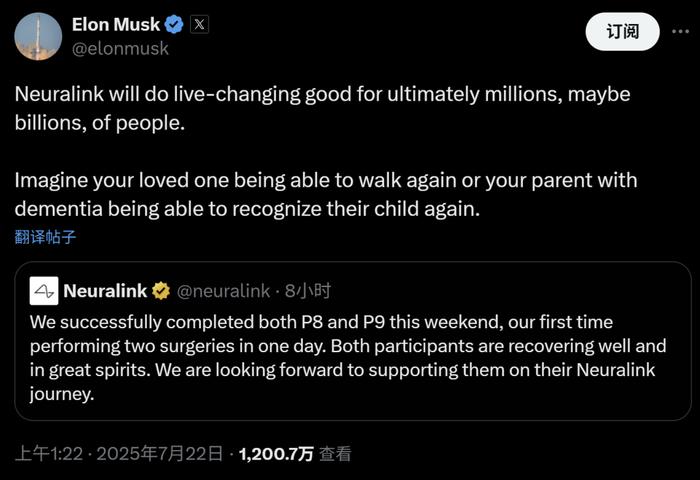
Musk’s Neuralink company has made significant progress.
On July 21st, local time, Neuralink announced on X (formerly Twitter) that for the first time in a single day, two subjects underwent brain-machine interface (BMI) surgery: “Last weekend, we successfully completed surgeries on P8 and P9 (the eighth and ninth subjects), marking our first successful completion of two surgeries within a day. Both patients are recovering well and mentally stable.”
Musk reposted and commented on this tweet, writing: “Neuralink will ultimately change the lives of millions or even billions of people. Imagine your loved ones being able to walk again, or parents with dementia being able to recognize their children again.”
Musk stated that Neuralink “will ultimately change the lives of millions or even billions of people.” Source: X
For Neuralink, completing two surgeries within a day is a significant advancement, enhancing the practicality of the technology. Founded in 2016, Neuralink primarily focuses on brain-machine interface (BCI) research, developing a device capable of being implanted into the brain to enable “human brain interaction with machines.” By the end of 2023, Neuralink announced the completion of the world’s first human BMI trial. The chip was named “Telepathy.”
Previously, Neuralink had enrolled seven subjects, including four spinal cord injury patients and three ALS patients. These subjects are using the equipment frequently, with data showing an average weekly usage of about 50 hours, with peaks exceeding 100 hours.
At the end of June this year, Neuralink released a one-hour video showcasing their latest research findings and product development directions.
Neuralink states that by 2028, the number of electrodes will exceed 25,000, reaching deeper brain regions for the treatment of mental disorders and neuropathic pain, and beginning to explore deep integration with AI. Neuralink believes that, if successful, by 2028, it might be possible for all humans to connect with AI.
Neuralink’s ultimate goal is to build a “brain-computer interface.” A brain-computer interface refers to the ability to write information to any part of the neurons anywhere, enabling high-bandwidth connections between the biological brain and external machines. These can be achieved through fully automated surgeries, which can be used 24/7.
At the beginning of June this year, Neuralink announced that it had raised $650 million in its latest round of financing. After the previous round of financing, Neuralink’s valuation had reached $9 billion, and after the latest round of financing, the company’s valuation is expected to surpass one hundred billion dollars.
However, last week, foreign media reported that Neuralink marked itself as a “small disadvantaged business” in a federal filing submitted to the Small Business Administration (SBA), with the filing date marked as April 24. The SBA website shows that this qualification allows businesses to “prioritize access to federal procurement opportunities.” Previously, the U.S. Department of Justice had fined companies for falsely claiming the “small disadvantaged business” status.